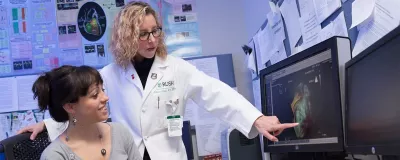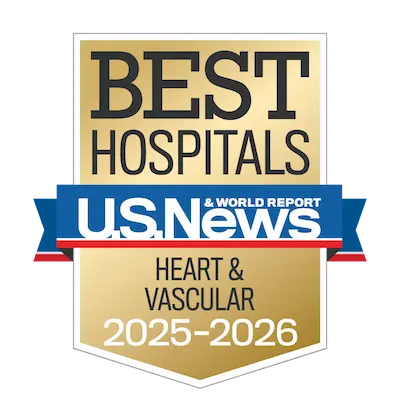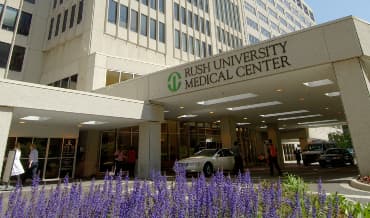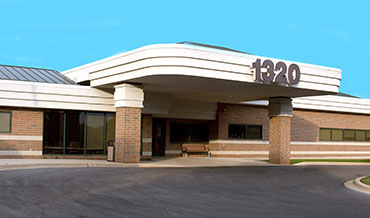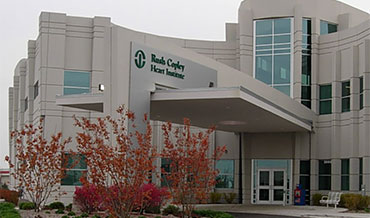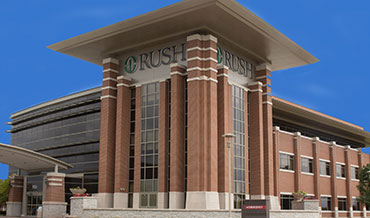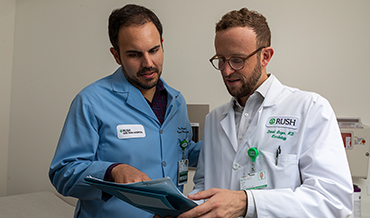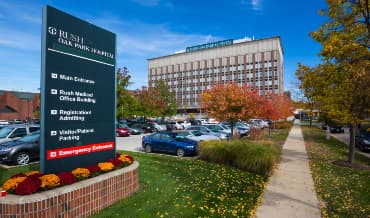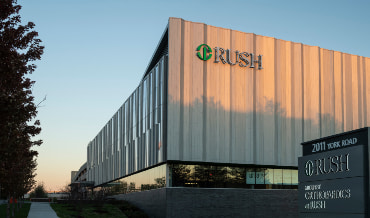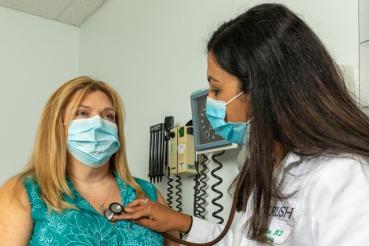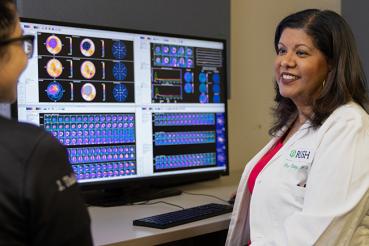The Rush Approach to Cardiology Services
Whether you have coronary artery disease, high blood pressure, aortic aneurysms or other conditions, our cardiologists have the expertise to diagnose and treat all types of heart and vascular problems. We will work closely with you and your family to coordinate every aspect of your care, including other specialists, and outpatient and home-based services if needed.
And if you are at risk for developing heart and vascular disease, cardiologists can help you reduce your risk factors and improve your overall heart health through nutrition counseling and lifestyle changes.
Angela's Story

Heart Disease Prevention at Rush
It’s never too early to start taking steps to prevent heart disease. And if you have concerns, like a family history of heart problems or a personal history of smoking, addressing them early can make a big difference for your heart health.
Our team evaluates your risks and can start stress tests for patients as young as 18 years old. You’ll have nutritionists, therapists and specialists who can help you make lifestyle changes to improve heart health, as well as physicians from a range of specialties to address any other health issues that can affect your heart. They can even provide congenital heart disease treatment if you have any heart conditions that you were born with. Find out more about these services on our Heart Disease Prevention Services page.
Getting a Second Opinion for Cardiology Services
If a physician has advised you to get treatment for a heart condition, getting a second opinion can help you explore your options and give you confidence in making decisions about your care.
To get an appointment for a second opinion with a Rush cardiologist, call us at (888) 352-7874. A care coordinator will help you with scheduling and gathering any information you’ll need.
Our team will evaluate your health and consult with a range of different types of physicians, surgeons and specialists who all work together for you. They’ll form a treatment plan to address your unique needs and talk to you about your care options. You'll have advanced therapies for all heart diseases and conditions available to you.
Rush Excellence in Cardiology
- Screening packages with no referral needed: We offer many heart screening options that can help cardiologists find any heart problems you may have or put your mind at ease if no issues are found. These diagnostic tests are often recommended to get a better perspective on heart health but don’t require a prescription or a doctor’s referral. Visit our page on Heart and Vascular Screenings to learn how you can set up an appointment.
- Advanced imaging: Our diagnostic imaging services offer the full spectrum of heart and vascular imaging as needed to assess your risks before, during and after treatment. Some of these imaging tests include MRI, sarcoid PET imaging, CT Angiography, echocardiogram and electrophysiology studies.
- Minimally invasive procedures: Through our structural heart disease care program, interventional cardiologists offer innovative procedures that treat heart and valve issues through catheters instead of open heart surgery. They can implant devices and stents to treat issues like coronary artery disease. For patients, that means faster recovery time with fewer complications.
- Heart health for patients with cancer: We are one of very few health systems to have a dedicated cardio-oncology program that focuses on preventing or minimizing heart damage caused by cancer treatments. Our team performs full evaluations and works with cancer care teams to adjust cancer treatments and medications, protecting patients’ hearts as much as possible.
- Access to clinical trials: You’ll have access to groundbreaking clinical research, such as trials in preventive cardiology care, cardiovascular imaging and management of heart failure. These can give you treatment options that you may not find anywhere else. Learn more on our Clinical Trials and Studies page.
- Specialized care for women: Women can experience heart disease differently than men do, and they may need care that addresses their specific needs. Rush's Heart Center for Women in Chicago and Rush Copley Medical Center's Women's Heart Center in Aurora offer comprehensive treatments, prevention services and connections to local support groups just for women. Learn more on our Women's Heart Care page. Rush also has a comprehensive cardio-obstetrics program and coronary microvascular disease program that provide personalized care for women.
- Nationally ranked healthcare: U.S. News & World Report includes Rush University Medical Center on its Best Hospitals Honor Roll and ranks our cardiology, heart and vascular surgery programs among the best in the nation. The Society of Thoracic Surgeons has also designated thoracic surgery at Rush a three-star program — the society’s highest rating — for coronary bypass graft surgery.
- Follow-up care closer to home: We’ve been providing heart disease treatment in Chicago and the surrounding areas for decades. Our cardiology teams in Oak Park, Aurora/Fox Valley and Northwest Indiana share physicians, technology and communications with Rush University Medical Center. This makes it seamless for you to get specialized services at Rush's downtown campus if you need them, while carrying out your treatment plan close to home.
- Telehealth appointments: Talk to a specialist today or tomorrow by scheduling a cardiology telehealth appointment. Join your one-on-one video visit using your smartphone, computer or tablet. Available for both new and existing Rush patients.
FAQs About Cardiology Services
Some of the most common signs of heart health issues include the following:
- Chest pain or discomfort
- Shortness of breath
- Palpitations
- Dizziness
- Swelling in the legs or feet
- Lack of stamina
- Fatigue
- Episodes of fainting
If you see any of the usual signs of heart problems listed above, you should ask your primary care doctor for a referral to a cardiologist. You can also call our cardiology department directly, and they can help you get an appointment.
Catching heart disease earlier makes treatment more effective. It also allows your cardiologist to reduce or prevent any major impact on your health. Our team has several screening tools for early detection of heart disease that provide detailed information on your health, which will allow your cardiologist to form an effective care plan.
When you come to Rush for treatment, you’ll have a team of specialists working together to make sure you’re seeing the right doctors who can guide you through your options. They’ll help you feel confident in your decisions about your care.
There are many lifestyle changes you can make that are good for your heart. The American Heart Association has a checklist called “Life’s Essential 8” that describes eight ways to improve and maintain heart and vascular health, which include the following:
- Eat better
- Be more active
- Quit tobacco
- Get healthy sleep
- Manage weight
- Control cholesterol
- Manage blood sugar
- Manage blood pressure
Our heart disease prevention services and the Rush Center for Prevention of Cardiovascular Disease can help you make these positive lifestyle changes. Our cardiologists will work with you and connect you with behavioral health psychologists, sleep medicine specialists, dietitians, smoking cessation specialists and social workers.
Each patient has different needs when it comes to heart health, so you should ask your doctor how often you need to see a cardiologist. If you are interested in screening for heart conditions, your primary care physician can make recommendations on how often to get tested. You can also call us directly to schedule screenings using the information on our Heart and Vascular Screenings page. We’ll set up an appointment for you to see a cardiologist if the screenings show anything unusual.
If you have been diagnosed with a cardiovascular condition, you may need to see a cardiologist more often. Your cardiologist will discuss follow-up appointments with you. For some conditions and services, like our cardiovascular rehab program, we offer both in-person and virtual options for follow-up appointments.
A heart attack involves a blockage in an artery. This leads to a lack of oxygen and blood supply to the heart muscle, causing heart muscle death. Cardiac arrest is a problem with the heart’s rhythm that causes the heart to stop beating. This can lead to brain injury, damage to the organs or death.
A heart attack can lead to cardiac arrest, which is why it’s very important to visit the emergency room if you’re having chest pain. But cardiac arrest can happen for other reasons, too. Most cardiac arrest happens because of abnormal heart rhythms that don’t allow blood to be pumped to the body. This usually has to be fixed by shocking the heart back into rhythm or using certain medications.
The most common test in cardiology is an electrocardiogram, or ECG. It gives your cardiologist a lot of information about the electrical system of your heart. But there are a few other tests that cardiologists commonly use to look at and image your heart. They can take an ultrasound, called an echocardiogram, that will tell them a lot about your heart muscle and heart valves. They can also do stress tests, like a PET scan, to check your heart’s circulation and see if there are any blockages. CT scans and cardiac MRIs are other tests that can check for blockages and give information on your heart’s structure and function.
If more in-depth testing is needed, as with heart failure patients, cardiologists can use tests that involve catheters. These tests allow them to take pictures of the heart and arteries and measure pressure within the heart.
Congestive heart failure happens when the heart muscle is no longer able to meet the demands of the body. Blood starts to come back to the heart faster than it can be pumped out, causing a backup.
There are two main types of congestive heart failure, and each has different kinds of treatments. One happens when the heart muscle gets weakened, which can happen for many reasons. It could be from a prior heart attack, a viral infection or stress, for example. The other kind happens when the heart muscle isn’t weak but becomes more stiff over time.
High blood pressure puts additional stress on the heart, which can cause the heart muscle to thicken over time. A thick heart muscle is stiffer and more rigid than a normal heart muscle and can lead to congestive heart failure. High blood pressure also stresses the arteries and can speed up the forming of blockages that come from high cholesterol and diabetes.
Cholesterol is a molecule that causes plaque to form and leads to blocked or narrowed arteries, not only within the heart, but also arteries to the brain, legs and feet.
Genetics play a role in almost every aspect of heart disease. But research shows that with lifestyle management, some of the effects that genetics have can be countered. And if your cardiologist feels that genetics are causing a big part in your heart problems, they can provide counseling for you and your family.

